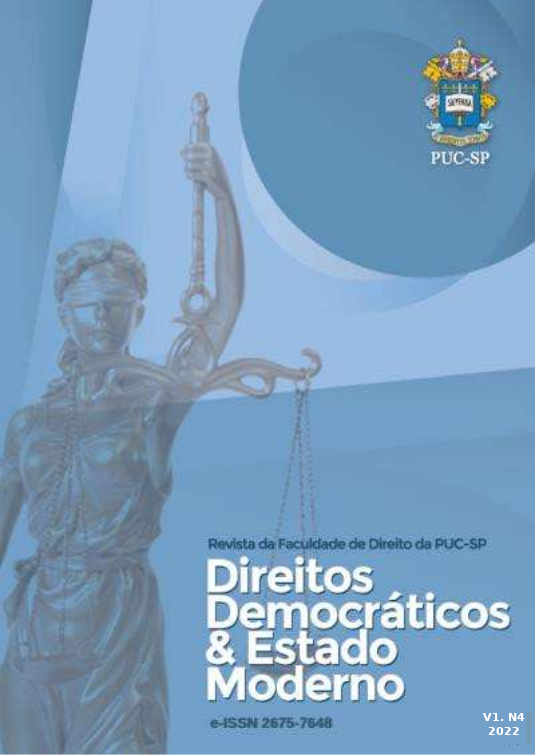Neutralidad de la red informática y derechos y garantías fundamentales
DOI:
https://doi.org/10.23925/ddem.v.1.n.4.56520Palabras clave:
Marco de Derechos Civiles para Internet, Tráfico, Derechos fundamentales, Neutralidad, PrincipioResumen
Este artículo busca resaltar el carácter de derecho fundamental de la neutralidad de la red, principio consagrado en los artículos 3 y 9 de la Ley nº 12.965/2014, que instituyó el Marco de Derechos Civiles en Internet. Por lo tanto, a la luz del artículo 5, § 2 de la Constitución Federal de 1988, pretende demostrar que es un derecho fundamental y, por lo tanto, una garantía de trato isonómico del usuario. Metodológicamente, la investigación se clasifica en deductiva, descriptiva y bibliográfica. Parece que la neutralidad de la red, a pesar de haber sido elevada a estatus legal con la llegada del Marco Civil da Internet, ya se discutía desde 2009, cuando se publicaron los principios rectores de la gobernanza de internet. Sin embargo, cuando se reconoce como un principio, la neutralidad de la red impone deberes a los proveedores para garantizar que todos no solo tengan acceso a Internet, sino también que no prioricen o discriminen cierta información, productos y servicios en la red mundial. Por lo tanto, para que la neutralidad de la red se observe efectivamente, todas las personas deben tener un acceso igualitario a todo lo que el mundo digital tiene para ofrecer, so pena de ser responsable del tratamiento discriminatorio del tráfico de datos responsable de violar esta importante garantía fundamental.
Citas
AFONSO, Carlos A. Neutralidade da rede: Desafios a enfrentar. 2014. Disponível em: http://observatoriodainternet.br/neutralidade-da-rede-desafios-a-enfrentar/. Acesso em: 13 out. 2021.
BRASIL. Comitê Gestor da Internet no Brasil. Resolução CGI.br/Res/2009/03/P. Princípios para a governança e uso da Internet no Brasil. 2009. Disponível em: https://principios.cgi.br/. Acesso em: 10 out. 2021.
BRASIL. Constituição da República Federativa do Brasil de 1988. Emendas Constitucionais de Revisão. Diário Oficial da União. Brasília, 05 out. 1988.
BRASIL. Lei nº 12.965, de 23 de abril de 2014. Estabelece princípios, garantias, direitos e deveres para o uso da Internet no Brasil. Diário Oficial da União. Brasília, 23 abr. 2014.
BURCH, Sally. Sociedade da informação: Sociedade do conhecimento. In: AMBROSI, Alain; PEUGEOT, Valerie; PIMIENTA, Daniel. Desafios de palavras: Enfoques multiculturais sobre as Sociedades da Informação. Paris: C & F Éditions, 2005, p. 1-8.
CASTELLS, Manuel. A sociedade em rede: A era da informação: Economia, sociedade e cultura v.1). São Paulo: Paz e Terra, 1999.
CASTELLS, Manuel. A sociedade em rede: Do conhecimento à ação política. In: CASTELLS, Manuel; CARDOSO, Gustavo (orgs.). A sociedade em rede: Do conhecimento à ação política. Belém: Centro Cultural, 2005, p. 1
CASTELLS, Manuel. A sociedade em rede: Do conhecimento à ação política. In: CASTELLS, Manuel; CARDOSO, Gustavo (orgs.). A sociedade em rede: Do conhecimento à ação política. Belém: Centro Cultural, 2005, p. 17-31.
CÉSAR, Daniel; BARRETO JUNIOR, Irineu Francisco. Marco Civil da Internet e neutralidade da rede: Aspectos jurídicos e tecnológicos. Revista Eletrônica do Curso de Direito da UFSM, v. 12, n. 1, p. 65-88, 2017.
DZIEKANIAK, Gisele; ROVER, Aires. Sociedade do conhecimento: Características, demandas e requisitos. Revista de Informação, v. 2, n. 5, p. 1-9, out. 2011.
GONÇALVES, Victor Hugo Pereira. Marco Civil da Internet. Comentado. São Paulo: Atlas, 2017.
JESUS, Damásio Evangelista de; MILAGRES, José Antônio. Marco Civil da Internet: Comentários à lei n. 12.965, de 23 de abril de 2014. São Paulo: Saraiva, 2014.
KHAN, S. Um mundo, uma escola: a educação reinventada. Tradução de George Schlesinger. Rio de Janeiro - RJ: Editora Intrínseca, 2013.
LEONARDI, Marcel. Responsabilidade civil dos provedores de serviços de Internet. São Paulo: Juarez de Oliveira, 2005.
MASSO, Fabiano Del; ABRUSIO, Juliana; FLORÊNCIO FILHO, Marco Aurélio. Marco Civil da Internet. Migalhas de Peso, 16 jul. 2014. Disponível em: https://www.migalhas.com.br/depeso/204359/marco-civil-da-internet. Acesso em: 10 out. 2021.
MELCHIOR, Silvia Regina Barbuy. Neutralidade no direito brasileiro. In: MASSO, Fabiano Del; ABRUSIO, Juliana; FLORÊNCIO FILHO, Marco Aurélio. Marco Civil da Internet: Lei 12.965/2014. São Paulo: Revista dos Tribunais, 2014, p. 99-137.
MOREIRA, Fábio Lucas. Da "sociedade informática" de Adam Schaff ao estabelecimento dos fundamentos e princípios do marco da Internet (PL 2.126/2011). In: MARQUES, Jader; SILVA, Maurício Faria da (orgs.). O direito na era digital. Porto Alegre: Livraria do Advogado, 2012, p. 13-46.
OLIVEIRA, Carlos Eduardo Elias de. Aspectos Principais da Lei nº 12.965, de 2014, o Marco Civil da Internet: Subsídios à comunidade jurídica. Texto para Discussão nº 148. Brasília: Núcleo de Estudos e Pesquisas/CONLEG/Senado, 2014.
OLIVEIRA, Rogério Alvarez. Marco Civil da Internet delineou a responsabilidade civil. Conjur, 28 abr. 2014. Disponível em: https://www.conjur.com.br/2014-abr-28/rogerio-oliveira-marco-civil-internet-delineou-responsabilidade-civil. Acesso em: 10 out. 2021.
PAESANI, Liliana Minardi. Direito e Internet: Liberdade de informação, privacidade e responsabilidade civil. 3. ed. São Paulo: Atlas, 2006.
PINHEIRO, Patrícia Peck. Direito digital. 5. ed. São Paulo: Saraiva, 2013.
SANTOS, Antonio Jeová. Dano moral indenizável. 6. ed. Salvador: JusPodivm, 2016.
SARMENTO, Daniel. Livres e iguais: Estudos de direito constitucional. Rio de Janeiro: Lúmen Juris, 2010.
SCAVONE JUNIOR, Luiz Antonio. Responsabilidade dos educadores na Sociedade da Informação. In: PAESANI, Liliana Minardi (coord.). O direito na sociedade da informação II. São Paulo: Atlas, 2009.
SIMÃO FILHO, Adalberto. Sociedade da Informação e seu lineamento jurídico. In: PAESANI, Liliana Minardi. O direito na sociedade da informação II. São Paulo: Atlas, 2017, p. 5-29.
YOO, Christopher. Would Mandating Network Neutrality Help or Hurt Competition? A Comment on the End-to-end Debate. Journal of Telecommunications and High Technology, [S.l], 2004.
Descargas
Publicado
Cómo citar
Número
Sección
Licencia
Derechos de autor 2022 Derechos democráticos & estado moderno

Esta obra está bajo una licencia internacional Creative Commons Atribución 4.0.
Este trabajo está bajo licencia Creative Commons Atribuição 4.0 Internacional.
Los autores otorgan a la revista todos los derechos de autor relativos a los trabajos publicados. Los conceptos emitidos en los artículos firmados son de absoluta y exclusiva responsabilidad de sus autores.
Revista DD&EM - ISSN 2675-7648

















